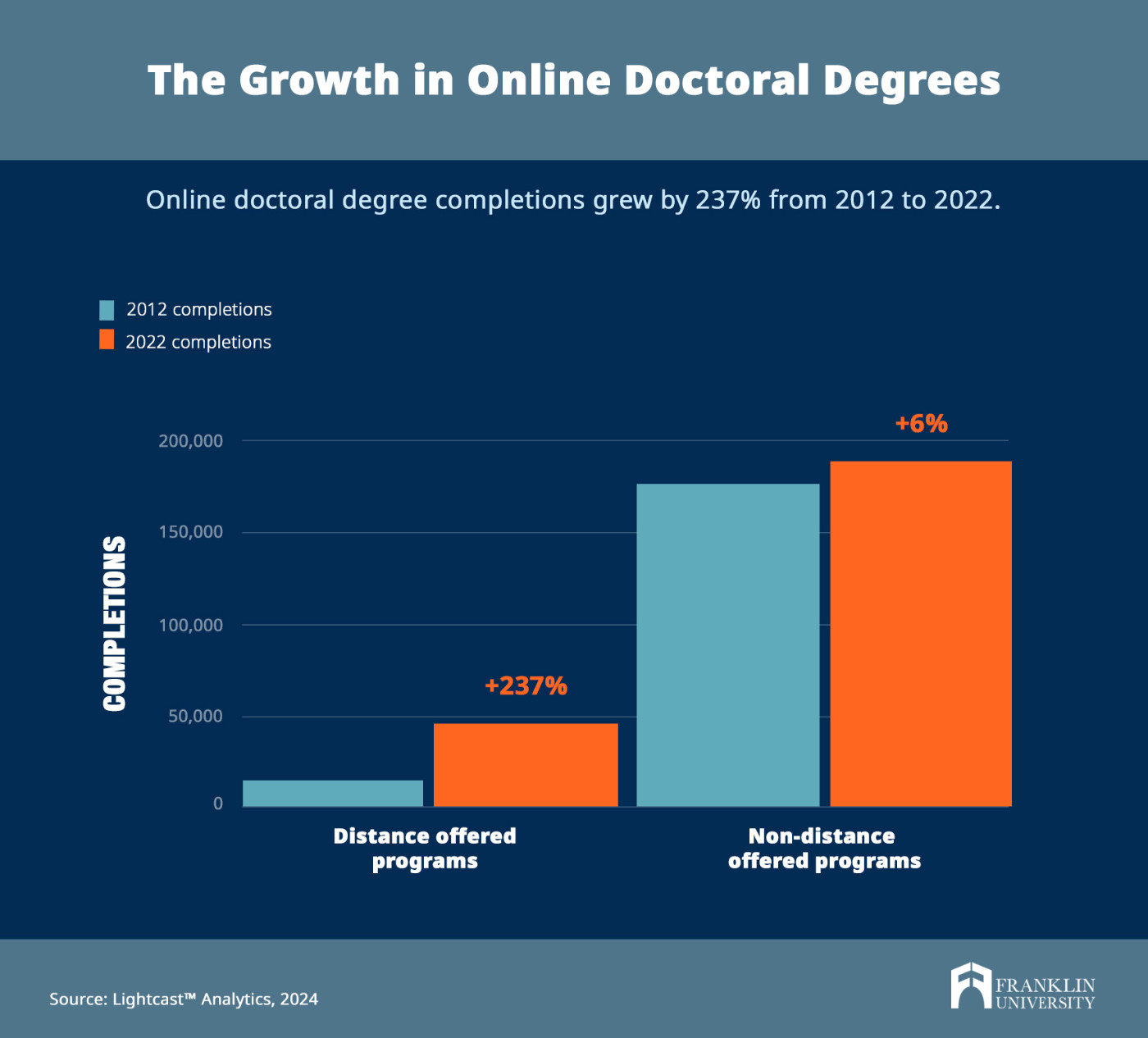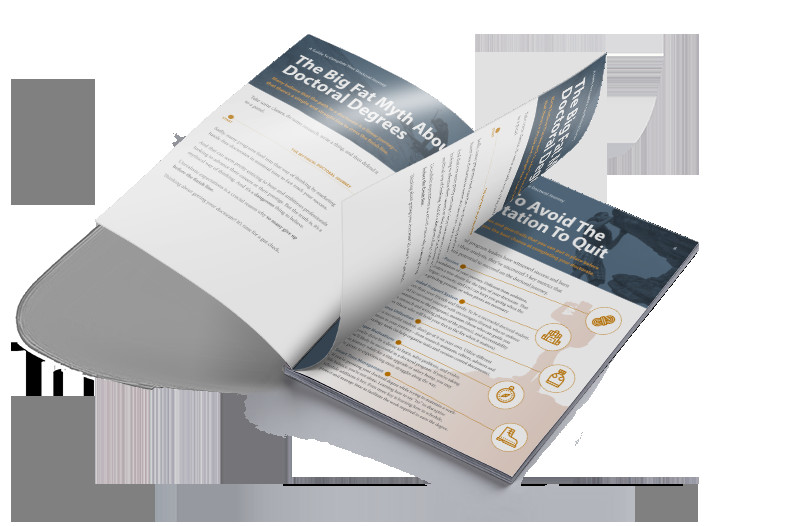 Student in library studying for doctorate
Student in library studying for doctorate
Earning a master’s degree is a significant achievement, but for some, the pursuit of knowledge and career advancement doesn’t stop there. If you’re contemplating the next step in your academic journey, you might be asking yourself, “What exactly is a Doctorate degree?” and “Is it the right path for me?”
A doctorate represents the highest level of academic achievement, signifying mastery in a specific discipline or professional field. This comprehensive guide will serve as your introduction to doctoral degrees, exploring what they entail, the diverse fields of study available, and the journey involved in obtaining one.
What Exactly is a Doctoral Degree?
The doctoral degree, often simply referred to as a doctorate, stands as the ultimate academic credential. It signifies that an individual has not only achieved deep expertise in a chosen field but has also contributed original research and analysis to expand the existing body of knowledge.
Doctoral programs are rigorous and demanding, requiring candidates to undertake extensive research, critical analysis, and articulate complex ideas effectively. Earning a doctorate is not merely about accumulating knowledge; it’s about generating new insights, proposing innovative solutions, and becoming a thought leader in your domain.
The rewards of completing a doctoral program are substantial. Graduates are highly sought after for top-tier positions in consulting, research, and academia. A doctorate positions you as an expert, providing a competitive edge in today’s dynamic job market and often fulfilling a significant personal and professional aspiration.
The Growing Demand for Doctoral Expertise
The need for doctoral degree holders is influenced by the evolving demands of various industries and sectors. Analyzing trends in degree completion offers valuable insights into the current landscape of doctoral-level education. Data from Lightcast Analytics reveals a significant 20% growth in doctoral degree completions between 2012 and 2022, rising from 170,815 to 205,341. This upward trend underscores the increasing value placed on advanced expertise and specialized knowledge in the workforce.
Certain doctoral categories have experienced particularly robust growth over this decade. These include:
- Business, Management, Marketing, and Related Programs: Experiencing a remarkable 75% increase, reflecting the growing complexity and strategic demands of the business world.
- Computer and Information Sciences and Support Services: Surging by 64%, driven by the rapid advancements and expanding importance of technology across all sectors.
- Education: Increasing by 49%, highlighting the ongoing need for highly qualified educational leaders and researchers to address the evolving challenges in education.
- Health Professions and Related Programs: Also growing by 49%, fueled by the expanding healthcare industry and the increasing demand for specialized healthcare professionals.
- Engineering: Demonstrating a solid 38% growth, reflecting the continuous innovation and technological advancements within engineering fields.
Zooming in further, specific doctoral programs have witnessed explosive growth. Occupational Therapy/Therapist (+1,134%) and Nursing Practice (+614%) lead the way, indicating a significant demand for advanced practice professionals in these healthcare areas. Organizational Leadership (+368%) and Social Work (+154%) also show strong growth, reflecting the increasing need for leadership and social expertise in various organizations and communities.
Conversely, some fields have seen a decrease in doctoral program demand, including Divinity/Ministry (-42%), History (-26%), Law (-22%), and Psychology (-16%). These trends suggest a shift in workforce demands and potentially evolving career paths within these disciplines.
These trends collectively illustrate that industries characterized by increasing complexity, rapid growth, and technological innovation are driving the demand for employees with advanced doctoral-level expertise. Conversely, industries experiencing slower growth or requiring less specialized skill development may see less demand for doctoral graduates.
The Accessibility Revolution: Online Doctorate Degrees
Historically, doctoral programs were predominantly offered in traditional on-campus settings. However, the landscape of higher education has shifted dramatically with the rise of flexible online learning platforms. Lightcast Analytics data highlights this transformation, revealing a staggering 237% surge in graduates from distance-offered doctoral programs between 2012 and 2022. In stark contrast, non-distance programs experienced a mere 6% growth during the same period.
This exponential growth of online doctoral degrees is evident across various disciplines, including those previously mentioned. Distance-offered completions have skyrocketed in fields like Law (150% increase), Nursing Practice (986% increase), Educational Leadership and Administration (General) (427% increase), and Business Administration and Management (General) (243% increase).
 Growth of online doctoral degrees
Growth of online doctoral degrees
This dramatic shift towards online doctorates reflects the increasing accessibility and flexibility of advanced education. Online programs cater to working professionals and individuals with diverse life circumstances, making doctoral studies attainable for a broader range of aspiring scholars and leaders.
Exploring the Two Main Types of Doctorate Degrees
When considering a doctorate, it’s crucial to understand that there are primarily two distinct types of doctoral degrees: research-oriented degrees and professional application degrees (also known as applied doctorates). While the lines between these two categories can sometimes blur, their core focus and career pathways differ.
Let’s delve into a detailed comparison of these two common doctorate program types:
The Ph.D.: The Pinnacle of Research
Research-oriented doctorates are most commonly known as Doctor of Philosophy degrees, or Ph.D.s. Despite the name, the “philosophy” in Ph.D. refers to the love of knowledge and pursuit of truth through rigorous inquiry, rather than the specific subject of philosophy itself. Ph.D. programs are deeply rooted in academic research and are designed to prepare graduates for careers in academia, research institutions, and think tanks.
In addition to the Ph.D., other research-oriented doctorates include:
- Doctor of Arts (D.A.): Often focused on pedagogy and curriculum development within arts disciplines.
- Doctor of Theology (Th.D.): Concentrating on advanced theological research and scholarship.
- Doctor of Public Health (DrPH): While sometimes practice-oriented, DrPH programs can also emphasize research in public health issues and interventions.
A cornerstone of any Ph.D. program is the dissertation. This substantial research project is the culmination of a Ph.D. candidate’s studies, requiring them to conduct original research, analyze data, and contribute new knowledge to their field. The dissertation process is a rigorous and demanding undertaking, often spanning several years.
Professional Doctorates: Applying Knowledge to Real-World Challenges
Professional doctorates, also called applied doctorates or terminal professional doctorates, are designed to equip graduates with advanced knowledge and skills to address complex challenges in professional practice. These programs emphasize the application of research and theory to real-world settings, preparing graduates for leadership roles in various industries and sectors.
You should consider pursuing a professional doctorate if your career goals include:
- Advancement in your current profession: A professional doctorate can significantly enhance your credentials and open doors to higher-level positions.
- Meeting requirements for senior leadership roles: Many executive and leadership positions in corporations and organizations increasingly require a doctoral degree.
- Establishing credibility as a subject matter expert: A professional doctorate demonstrates deep expertise and enhances your credibility as a consultant, advisor, or industry leader.
- Building a consulting practice: The applied focus of professional doctorates makes graduates well-suited to establish successful consulting businesses.
Common examples of professional doctorates include:
- Doctor of Business Administration (DBA): Focuses on advanced business practices, strategic leadership, and organizational management.
- Doctor of Education (Ed.D.): Designed for educational leaders and administrators, focusing on practical solutions to educational challenges.
- Doctor of Healthcare Administration (DHA): Prepares leaders for the complex healthcare industry, focusing on healthcare policy, management, and delivery.
- Doctor of Professional Studies (DPS): A versatile degree that can be tailored to various professional fields, emphasizing interdisciplinary problem-solving.
- Doctor of Finance (D.Fin.): Concentrates on advanced financial theory and practice, preparing graduates for leadership in finance and investment.
- Doctor of Social Work (DSW): Focuses on advanced social work practice, leadership in social services, and policy advocacy.
- Doctor of Pharmacy (Pharm.D.): A practice-based doctorate for pharmacists, emphasizing clinical expertise and patient care.
- Juris Doctor (JD): While technically a professional doctorate, the JD is the standard entry-level degree for lawyers in the United States, focusing on legal theory and practice.
While some professional doctorate programs may require a dissertation, others may culminate in a capstone project, applied research project, or portfolio that demonstrates the application of knowledge to real-world problems. Unlike the research-centric Ph.D., the professional doctorate curriculum emphasizes practical problem-solving, leadership development, and the application of research to address industry-specific challenges.
Navigating the Doctoral Degree Curriculum
The journey to earning a doctorate degree typically unfolds in four key stages of coursework, designed to build a strong foundation and culminate in independent research and scholarly contribution:
1. The Research Core: Building Foundational Skills
Most doctoral programs begin with a research core, a set of foundational courses designed to equip students with the essential skills needed for doctoral-level research and scholarship. This core curriculum is critical for establishing a solid base for the rigorous academic work ahead.
The research core typically includes courses in:
- Advanced Writing Methods: Developing sophisticated writing skills for academic and professional communication.
- Research Methodology and Design: Learning the principles of research design, data collection, and analysis.
- Applied Statistics: Mastering statistical methods for analyzing data and drawing meaningful conclusions.
- Colloquium Courses: Engaging in scholarly discussions and presentations to develop critical thinking and communication skills.
- Qualitative and Quantitative Research and Analysis: Gaining proficiency in both qualitative and quantitative research approaches.
2. Major Focus Area: Deepening Subject Matter Expertise
Once the research core is completed, students delve into courses within their chosen major area of emphasis. These specialized courses provide in-depth knowledge and advanced skills within a specific discipline or professional field.
For example:
- DBA (Doctor of Business Administration): Coursework often includes organizational behavior, organizational systems, strategic thinking and decision-making, ethics, and change management.
- DHA (Doctor of Healthcare Administration): Curriculum typically covers healthcare policy and regulations, healthcare economics and finance, quality improvement and process improvement, and health information governance.
- Ph.D. in Human Services: Coursework may include advanced study in research methods for public service, social influences of behavior, ethics in decision-making, and advanced communication for human services leaders.
3. Electives: Broadening Perspectives and Specialization
In addition to the core and major area coursework, most doctoral programs require students to complete elective courses within their broader field of study. Electives serve to broaden perspectives, allow for specialization, and provide a more well-rounded understanding of the chosen domain.
For instance, students pursuing a Doctor of Education (Ed.D.) may choose electives in focus areas such as:
- Higher Education Leadership: Focusing on the unique challenges and opportunities in leading colleges and universities.
- PK-12 Educational Leadership: Concentrating on leadership roles in primary and secondary education.
- Organizational Leadership: Exploring leadership principles and practices applicable across various organizational settings.
4. Dissertation Requirements: The Culmination of Doctoral Study
The dissertation (or doctoral project for some applied doctorates) represents the capstone of doctoral studies. It is a significant independent research undertaking that demonstrates a candidate’s ability to conduct original research, contribute new knowledge, and synthesize their learning.
For Ph.D. students, the dissertation is typically a comprehensive five-chapter document, developed in three phases:
- Phase 1: Prospectus Approval: Submitting a detailed proposal outlining the research topic, methodology, and expected contribution to the field.
- Phase 2: Dissertation Development and Data Collection: Finalizing the initial chapters of the dissertation and beginning the process of collecting and analyzing data.
- Phase 3: Dissertation Completion and Defense: Completing the writing of the dissertation and defending it orally before a committee of faculty experts.
For applied doctorate students, the dissertation or doctoral project may take different forms, often focusing on solving a real-world problem within their professional field. This might involve developing a new program, implementing an organizational change initiative, or conducting applied research with direct practical implications.
Understanding Dissertation Structures: A Key to Success
Given the dissertation’s central role in doctoral education, it’s crucial to understand dissertation structures and expectations early in your program. When evaluating prospective doctoral programs, research their dissertation requirements and support systems. Choosing a program with a well-structured dissertation process and robust faculty support can significantly enhance your chances of successful completion.
Institutions like Franklin University have intentionally designed dissertation structures to guide students step-by-step through the process. They also provide faculty mentoring, guidance, and peer-to-peer support to ensure students are not navigating this challenging phase alone. Throughout doctoral coursework, students at Franklin develop essential research skills and writing proficiency, culminating in a dissertation that showcases their ability to address real-world workplace challenges and propose evidence-based solutions.
Time Commitment: How Long Does a Doctorate Take?
The duration of a doctoral degree program varies depending on several factors, including the type of doctorate, the specific program design, the subject area, and the institution.
Doctoral programs typically require between 60 and 120 semester credit hours, equivalent to approximately 20-40 college courses. Ph.D. programs often lean towards the higher end of this range (around 120 hours), while applied doctorates may require fewer credit hours (closer to 60-80 hours). For instance, the DBA and DHA programs at Franklin University require 58 credit hours.
On average, completing a Ph.D. can take up to eight years, while a professional doctorate typically takes four to six years. However, these are averages, and individual timelines can vary.
Pro Tip: Some innovative institutions, like Franklin University, have streamlined their doctoral programs and offer flexible transfer credit options. Their program designs, which often integrate dissertation work throughout the curriculum and provide a strong community of support, can enable students to earn their doctorate in as little as three years.
Is a Doctoral Program Right For You? Assessing Your Fit
Beyond holding a master’s degree and relevant professional experience, certain personal qualities and circumstances contribute to success in doctoral studies. Ideal doctoral candidates are typically:
- Organized and self-disciplined: Doctoral programs demand strong organizational and time management skills to juggle coursework, research, and personal commitments.
- Curious and intellectually driven: A genuine passion for learning and in-depth inquiry is essential for the sustained effort required in doctoral studies.
- Effective time managers: Many doctoral students are working professionals and have family responsibilities, necessitating excellent time management abilities.
- Highly motivated and resilient: The doctoral journey is challenging, requiring strong motivation and perseverance to overcome obstacles and maintain momentum.
The rewards of a doctorate are significant, potentially leading to increased earning potential, expanded career opportunities in higher education and leadership, and the fulfillment of lifelong personal and professional goals.
Dr. Wendell Seaborne, Dean of Doctoral Studies & Academic Research at Franklin University, exemplifies the transformative impact of a doctorate: “I went from a successful 27-year career in the electric utility industry to higher education. This change has allowed me to positively affect literally thousands of lives over the past 18 years I have spent as a full-time educator.”
Franklin University’s applied doctorate programs, with their 8-week courses and asynchronous learning options, are specifically designed to accommodate working professionals with busy lives and a desire to make a meaningful impact.
The Compelling Reasons to Pursue a Doctorate
Embarking on a doctoral program is a significant commitment with a substantial return on investment for master’s degree holders seeking to elevate their careers and expand their impact.
A doctorate is often a necessary credential for those seeking faculty positions in higher education. For individuals aspiring to industry leadership roles, a doctorate provides significant credibility and expertise. And for those aiming for the highest levels of organizational leadership, a doctorate can be a key differentiator in a competitive landscape.
To determine the best path for you – research-focused or applied – explore resources like “Five Truths About Applied Doctorates” to gain further insights.
Free Guide:
 Blueprint to Complete Doctoral Journey
Blueprint to Complete Doctoral Journey
Download Now: How to Complete Your Doctoral Journey
How to Complete Your Doctoral Journey
Discover common pitfalls and the 5 key metrics that will help you finish your doctorate degree.

